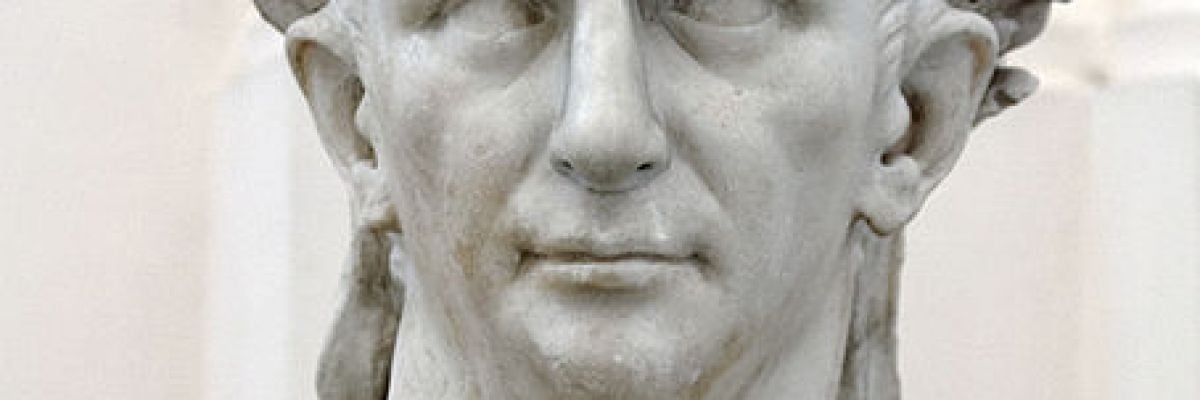
In the book of Acts, St. Luke records the travels of the apostle Paul. At one point we read:
After this he left Athens and went to Corinth. And he found a Jew named Aquila, a native of Pontus, lately come from Italy with his wife Priscilla, because Claudius had commanded all the Jews to leave Rome [Acts 18:1-2].
This indicates that St. Paul arrived at Corinth shortly after the Emperor Claudius (pictured) expelled the Jews from Rome.
Would a Roman Emperor actually expel an entire ethnic group from the city of Rome?
Difficulties
That could cause difficulties, because the Jewish population would have engaged in trade with others in Rome, and it could cause financial disruptions.
Some likely even married Gentiles in Rome, as we know happened elsewhere in the empire (e.g., St. Timothy’s mother was Jewish, but his father was a Greek; Acts 16:1).
Do we have any evidence—besides what St. Luke himself says—that this event ever happened?
“Most Excellent Theophilus”
The internal evidence would point to the account being genuine.
Since Luke is writing to a Roman official of some kind, who he addresses as “most excellent Theophilus” (Luke 1:3)—he would scarcely be likely to make up such an event. The official to whom he was writing would be in a position to know if Claudius had never issued such an order.
Also, making up this detail wouldn’t seem to serve any purpose for Luke’s narrative. Aquila and Priscilla could have moved to Corinth for any number of reasons. There would be no need for Luke to make up an imaginary expulsion of the whole Jewish community from Rome.
Even without further evidence, it would be natural to conclude that the event took place and was common knowledge, which Luke’s reader—Theophilus—would have already been aware of.
But it turns out that we actually do have independent evidence of this event.
The Twelve Caesars
In the early 100s, a Roman historian named Suetonius wrote biographical sketches of the Caesars who had reigned from Julius Caesar down to the Emperor Domitian.
This work, known as The Twelve Caesars, contains an apparent reference to the same event that St. Luke wrote about.
In the life of Claudius, Suetonius wrote:
Since the Jews constantly made disturbances at the instigation of Chrestus, he [Claudius] expelled them from Rome [Claudius 25].
We thus have external verification that Claudius did, in fact, expel the Jews from Rome.
But there is something else interesting here . . .
Chrestus?
Suetonius notes that the “disturbances” that caused the Jewish community’s expulsion were “at the instigation of Chrestus.”
Who was Chrestus?
At the time, the name “Chrestus” was in use in some circles, but we don’t know of a particular historical figure by that name who might have been stirring up the Jewish community in Rome.
Many historians have noted, though, that the name “Chrestus” is just one vowel different from the Latin word for Christ—“Christus.”
Since we know from other sources (including Acts) that the proclamation of the Christian message often led to disturbances in the Jewish communities, it is frequently suggested that this is why Claudius ended up expelling the Jews of Rome.
Suetonius simply misheard or misremembered the name “Christus,” or perhaps there was a scribal error.
In other words: The message of Christ was being preached among the Jews in Rome, it was causing riots, and so Claudius kicked them all out, leading Aquila and Priscilla to move to Corinth.
Given the evangelizing tendencies of these two (see Acts 18:18, 26), they may have been among the very Jews whose preaching caused the riots (a fact that Luke probably would not be inclined to mention to Theophilus).
Suetonius’s View?
The interpretation just offered is not certain. For one, Suetonius was aware of who Christians were. He mentions them later, in his biography of Nero, when the latter tried to blame the Great Fire of Rome on them in A.D. 64.
They apparently came back after Claudius was poisoned in A.D. 54 and his expulsion of the Jews became a dead letter. Indeed, St. Peter and Paul were martyred at Rome in the 60s.
It also should be noted that Suetonius seems to think of Chrestus as a still-living individual who was personally stirring up the Jewish community in Rome.
The latter confusion, if it was a confusion, might have been based on Christians’ insistence that Jesus was still alive (due to the Resurrection).
We can’t say either way for certain, but the possibility here that Suetonius has a garbled account of disturbances that took place in Rome between Christian and non-Christian Jews is intriguing.
In any event, we still appear to have independent, Roman confirmation of a point in St. Luke’s narrative in Acts.
According to the best information we have, Claudius’s expulsion of the Jews took place in the ninth year of his reign, which would correspond to A.D. 49. Since we can place St. Paul in Jerusalem in early A.D. 49, his meeting with Priscilla and Aquila in Corinth likely took place late in the year.
Learning Our Story
The record provided in the book of Acts is part of our story as Christians.
It’s helpful to us to understand that story better. The more we know about it, the closer we grow to our Christian heritage, and that can help us grow closer to God.
If you’d like to learn more about our Christian heritage, you should check out my book, The Fathers Know Best, which deals with the Church Fathers, who lived in the age that connects the world of the Bible to the later ages of Christian history.



